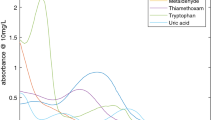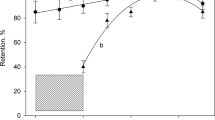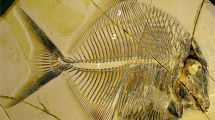Abstract
IN a recent communication, Baas Becking, Haldane and Izard1 claimed to have found up to 100 p.p.m. of perchlorate in sea and ocean waters, and between 100 and 1,000 p.p.m. in estuarine and inshore waters. They have suggested that this perchlorate is formed from chloride in the water by oxidation, and that the formation of perchlorate in this manner will reduce the chlorinity of the water to the extent of up to the second decimal per mille.
This is a preview of subscription content, access via your institution
Access options
Subscribe to this journal
Receive 51 print issues and online access
$199.00 per year
only $3.90 per issue
Buy this article
- Purchase on Springer Link
- Instant access to full article PDF
Prices may be subject to local taxes which are calculated during checkout
Similar content being viewed by others
References
Baas Becking, L. G. M., Haldane, A. D., and Izard, D., Nature, 182, 645 (1958).
Klemperer, H. G., Biochem. J., 67, 381 (1957).
Nabar, G. M., and Ramachandran, C. R., Anal. Chem., 31, 263 (1959).
Author information
Authors and Affiliations
Rights and permissions
About this article
Cite this article
GREENHALGH, R., RILEY, J. Alleged Occurrence of the Perchlorate Ion in Sea-Water. Nature 187, 1107–1108 (1960). https://doi.org/10.1038/1871107a0
Issue Date:
DOI: https://doi.org/10.1038/1871107a0
This article is cited by
-
Estimation of Low Concentrations of Perchlorate in Natural Materials
Nature (1962)
-
Hydrographische Bibliographie
Deutsche Hydrographische Zeitschrift (1961)
Comments
By submitting a comment you agree to abide by our Terms and Community Guidelines. If you find something abusive or that does not comply with our terms or guidelines please flag it as inappropriate.



